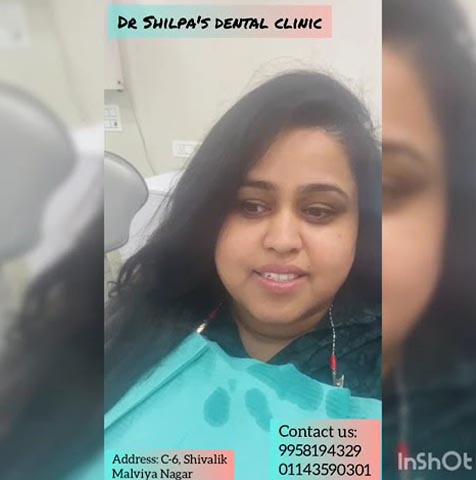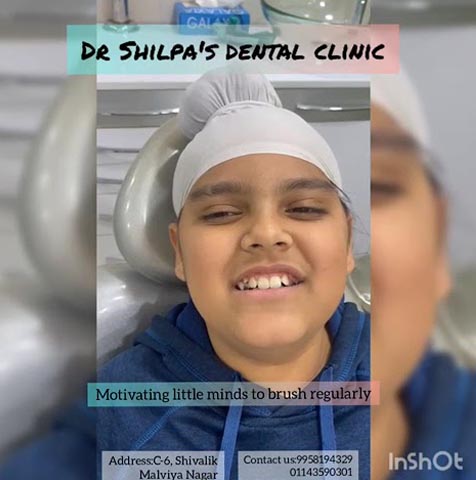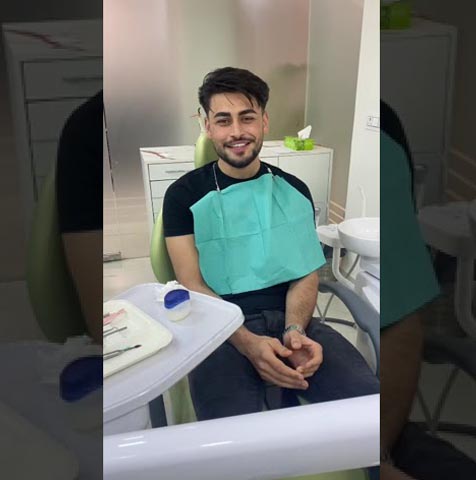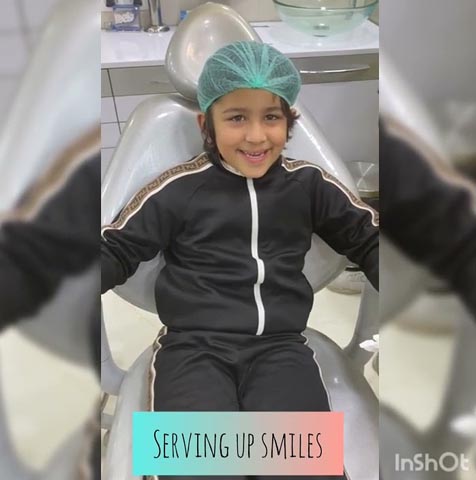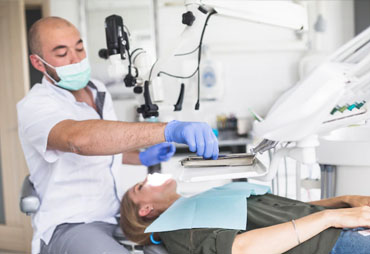
Welcome to Root Canal Dentistry Services at Dr. Shilpa’s Dental Clinic
Root canal dentistry, also known as endodontics, is a specialized branch of dentistry that focuses on the diagnosis, treatment, and prevention of diseases and injuries affecting the dental pulp and surrounding tissues. At Dr. Shilpa’s Dental Clinic, our experienced endodontists are dedicated to providing compassionate and effective root canal treatment to relieve pain, save damaged teeth, and restore oral health.
The In-House Technologies Available
-
CBCT / 3D X-Rays:
This X ray scan allow us to study the root canal system accurately as an additional data input to performing superior root canals
-
Rubber Dam:
Allows for patient comfort, one sitting, and infection free root canals.
-
Waterlase Laser Systems:
Allows for additional disinfection.
-
Operating Microscope:
Allows for better visualisation.
Understanding Root Canal Therapy
Root canal therapy is a common dental procedure performed to treat infected or inflamed dental pulp, the soft tissue located inside the tooth. When the dental pulp becomes damaged due to decay, trauma, or other factors, it can lead to severe tooth pain, sensitivity, and infection. Root canal therapy involves removing the infected or damaged pulp, cleaning and disinfecting the root canal system, and sealing the tooth to prevent further infection.
Signs and Symptoms That May Indicate the Need for Root Canal Treatment
- Severe Tooth Pain: Persistent or intense tooth pain, especially when chewing or applying pressure, may indicate the presence of dental pulp inflammation or infection.
- Sensitivity to Temperature: Increased sensitivity to hot or cold temperatures, even after the stimuli have been removed, may be a sign of dental pulp damage.
- Swelling and Tenderness: Swelling, redness, or tenderness in the gums or surrounding facial tissues may indicate an infection spreading from the tooth root.
- Darkening or Discoloration: Discoloration or darkening of the tooth may occur as a result of internal damage or decay affecting the dental pulp.
- Prolonged Tooth Mobility: Loose or wobbly teeth may be a sign of advanced dental pulp damage and may require root canal therapy to stabilize the tooth.
Root Canal Dentistry Services Offered
At Dr. Shilpa’s Dental Clinic, we offer a comprehensive range of root canal dentistry services to address a variety of endodontic concerns, including:
- Root Canal Therapy: Our skilled endodontists perform root canal therapy using advanced techniques and technologies to remove infected or inflamed dental pulp, clean and disinfect the root canal system, and seal the tooth to prevent reinfection.
- Apicoectomy: In cases where root canal therapy is not sufficient to address persistent infection or inflammation, apicoectomy may be recommended. This surgical procedure involves removing the tip of the tooth root and sealing the root canal to eliminate infection and promote healing.
- Root Canal Retreatment: In some cases, a previously treated tooth may experience reinfection or persistent symptoms. Root canal retreatment involves removing the existing filling material, cleaning the root canal system, and resealing the tooth to address any remaining infection or inflammation.
- Cracked Tooth Treatment: Cracked teeth can allow bacteria to penetrate the tooth and cause infection. Our endodontists are skilled in diagnosing and treating cracked teeth to prevent further damage and preserve tooth structure.
The Root Canal Treatment Process
- Initial Consultation: During your initial consultation, our endodontist will perform a thorough examination of your teeth and gums, review your medical and dental history, and discuss your symptoms and treatment options.
- Diagnostic Tests: Our team may perform diagnostic tests such as X-rays or pulp vitality tests to assess the extent of dental pulp damage and determine if root canal treatment is necessary.
- Root Canal Therapy: If root canal therapy is recommended, our endodontist will begin the treatment process by numbing the tooth and surrounding tissues with local anesthesia. The infected or inflamed dental pulp will be removed, and the root canal system will be cleaned, shaped, and disinfected. The tooth will then be sealed with a biocompatible material to prevent reinfection.
- Follow-up Care: After root canal therapy, you may experience some mild discomfort or sensitivity, which can usually be managed with over-the-counter pain relievers. Our team will provide you with post-operative care instructions and schedule follow-up appointments to monitor your healing progress.
Why Choose Dr. Shilpa’s Dental Clinic for Root Canal Dentistry?
- Experienced Endodontists: Our skilled endodontists have years of experience and expertise in performing root canal therapy and other endodontic procedures.
- State-of-the-Art Facilities: Our clinic is equipped with the latest dental technology and instruments, allowing us to provide precise, efficient, and comfortable root canal treatment in a modern and welcoming environment.
- Compassionate Care: We understand that undergoing root canal therapy can be intimidating for some patients, which is why we prioritize patient comfort and satisfaction throughout the treatment process. Our team will take the time to address your concerns, answer your questions, and ensure that you feel relaxed and at ease during your visit.
- Comprehensive Services: In addition to root canal therapy, we offer a wide range of dental services to address all
FAQs (Frequently Asked Questions) about Root Canal Treatment:
Q: What is root canal treatment? A: Root canal treatment, also known as endodontic therapy, is a dental procedure performed to remove infected or inflamed dental pulp from inside the tooth, clean and disinfect the root canal system, and seal the tooth to prevent further infection.
Q: Why is root canal treatment necessary? A: Root canal treatment is necessary when the dental pulp becomes infected or inflamed due to deep decay, repeated dental procedures on the tooth, a cracked or fractured tooth, or trauma to the tooth. Without treatment, the infection can spread, leading to severe pain, abscess formation, and tooth loss.
Q: Is root canal treatment painful? A: Contrary to popular belief, root canal treatment is not typically painful. With modern techniques and anesthesia, most patients experience little to no discomfort during the procedure. Any discomfort after the procedure is usually mild and can be managed with over-the-counter pain relievers.
Q: How long does root canal treatment take? A: The duration of root canal treatment varies depending on factors such as the complexity of the tooth’s anatomy, the extent of infection, and the number of canals to be treated. In most cases, root canal therapy can be completed in one to two appointments.
Q: What are the alternatives to root canal treatment? A: The only alternative to root canal treatment for saving a tooth with infected or inflamed dental pulp is tooth extraction. However, tooth extraction should be considered a last resort, as it may lead to additional dental problems and the need for tooth replacement options such as dental implants or bridges.
Q: How long does a root canal-treated tooth last? A: With proper care and maintenance, a tooth that has undergone root canal treatment can last a lifetime. After root canal therapy, the tooth is typically restored with a dental crown or filling to protect it from further damage and restore its strength and function.
Q: Can I drive myself home after root canal treatment? A: Most patients are able to drive themselves home after root canal treatment, as the effects of local anesthesia wear off shortly after the procedure. However, if you have received sedation or if you feel any discomfort that may impair your ability to drive safely, it’s best to arrange for a ride home.
Q: Will my tooth need any special care after root canal treatment? A: After root canal treatment, it’s important to practice good oral hygiene habits, including brushing your teeth twice a day, flossing daily, and attending regular dental check-ups and cleanings. Avoid chewing on hard or sticky foods and follow any post-operative care instructions provided by your endodontist.



